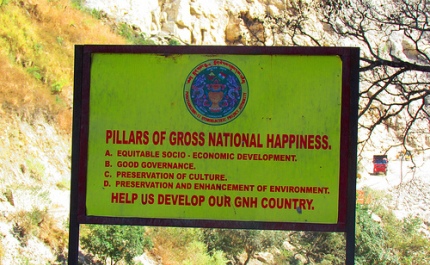Can you cut 1 Tonne of carbon pollution out of your life?
Take the challengeAristotle argued, “Happiness then (sic) is the best, noblest, and most pleasant thing in the world”. It’s the chief good and the end to which all things aim. As a society we want it now and we want it in abundance. If you’re selling it then we’ll buy. And, as it turns out, money actually can buy happiness - up to a point.
Happiness economics is a discipline based on the quantitative study of the overall happiness of societies. Metrics such as well being, quality of life and life satisfaction are all taken into consideration before dishing out the overall happiness rating. Generally, we'd assume that wealthy, more developed nations would have a higher happiness rating than their developing counterparts. But this isn't always the case.
In the 1970's, economist and professor Richard Easterlin discussed what we now know as the Easterlin Paradox. It's a key concept outlining the incongruous results between an increase of economic growth for a country and levels of social welfare; such as happiness. In other words, it was observed that the objective life conditions of citizens would improve as they became richer, but on a national scale they wouldn't be happier.
More recently, research has come out to explain why this is so. The study High income improves evaluation of life but not emotional well-being by Daniel Kahneman and Angus Deaton puts forward that emotional well-being – the frequency and intensity of experiences of joy, affection and other emotions that make one's life pleasant – does in fact, rise with the level of one's income. But there is no further progress beyond an annual income of (US) $75,000. Once our basic needs are met and we have a safety net that will allow us to deal with situations such as divorce or loss of a job, the excess becomes superfluous.

Bhutan has introduced a Gross HappinessIndex. Image source: Kienco
This is further supported by an international survey from the Pew Research Centre that found while many emerging countries had higher rates of life satisfaction as their national GDP increased, there were only marginal differences in happiness between citizens of countries with exceptionally higher GDP ratings than those of emerging nations that had recently seen modest levels of economic growth. The study also notes that the convergence in attitude levels between emerging and advanced nations is not due to a decrease in life satisfaction of richer countries. Money can only buy so much happiness.
Why aren't we getting happier?
We are drowning in stuff. The average household has 300,000 items, and the self-storage market is currently going through the roof because we can no longer manage the constant influx of purchases being made. We have so much stuff that over the course of a lifetime, you'll likely spend a total of 3,680 hours or 153 days searching for misplaced items, 72% of which goes missing in your home.

Hoarders. Image source A & E.
The waste produced and resources drained from this level of consumption is devastating our fragile planet. Consider the fast fashion industry; which is the second most polluting industry in the world behind oil. Most fast fashion retailers refresh their collections daily. Gone are the days of a spring/summer and autumn/winter collection. What you wore today may well be off trend by tomorrow.
So why do we continue to purchase?
Adaptation is the enemy of happiness, especially in relation to product purchases.
When we first buy something we experience a rush of happiness. This rush may have even been around prior to the purchase, as we fantasised what our lives might be like and who we might be once we had made the purchase. But as we know, humans can adapt to almost anything, and after a while, we habituate our purchases. They lose that new car smell and begin to seem lacklustre. Perhaps they need maintaining and even become a source of annoyance, should they be replaced? We then find ourselves on a hedonic treadmill, always looking for the next hit. This is because happiness, like satisfaction from hunger pains, is fleeting, and even more so when we attempt to satiate ourselves through product purchases.
Quit your job and travel (science says its ok)

Image source: Unsplash
All this isn't to say that spending money doesn't make us happy, it can. To quote Bond babe Bo Derek, "You just need to know where to go shopping".
Studies have shown that when it comes to spending disposable income, experiential purchases tend to make people happier than material purchases; this is especially true when we look at the long-term satisfaction levels of a purchase. When test groups that made either a product or an experience purchase were asked at different intervals after the sale how they felt about their overall happiness with the transaction the results showed that directly after the sale they had similar levels of satisfaction. But as time went on those who had purchased a product were significantly less happy with the decision, and those who purchased an experience had an increase in happiness with their choice. Product purchases become stale with time, but experiences become cherished memories.
This happens for a few reasons. When it comes to purchasing a product we are more likely to negatively compare our choice against that of our peers, for example, does my model have the same (or better) capabilities of yours; how many horsepower, pixels, carat am I missing out on? Yet with an experience, this is less likely to happen. We are in fact more likely to bond over a shared experience like a concert or a trip and experience further increased levels of happiness as we recall it than we are to negatively compare.
Even when an experience is bad, our memories of it become fonder over time. This occurs because experiences can be judged on both abstract and concrete levels. A camping trip may be judged on a concrete level as a failure: all the tyres blew, food was forgotten and you didn't reach the destination. But on an abstract level it was a success: the group banded together, something funny happened and you felt closer after the experience. When we evaluate on multiple levels it is more likely that we'll be able to draw something positive from the event.
More, more, more!
The interesting thing with all of this is that even though there's a lesson to be learnt from the fact that experiences make us happier than products, more happiness might not be what we need. As I mentioned earlier, happiness is evanescent. We cannot sustain a perpetual state of happiness, and the undeviating pursuit of this prize emotion might in fact, be making us less happy. What some researchers suggest we need more of is meaning.
So what's the difference between the two? One study associates happiness with taking and meaning with giving.
“Happiness without meaning characterizes a relatively shallow, self-absorbed or even selfish life, in which things go well, needs and desire are easily satisfied, and difficult or taxing entanglements are avoided… If anything, pure happiness is linked to not helping others in need,"- Baumeister, Vohs, Aaker & Garbinsky 2012
Happiness is about feeling good, while meaning is obtained through contribution, giving and a sense of purpose to drive you, even if this is at the expense of our immediate happiness. Take for example environmental climatarians (those who abstain from eating meat for environmental reasons). These people - unlike traditional vegetarians who might choose not to eat meat for reasons of animal sentience – enjoy and take pleasure from eating meat, yet they abstain for the greater good of the climate and in turn, human kind. They deny themselves happiness in order to gain meaning.
When it comes to a life well lived, feeling good is not enough. No man is an island and therefore we must find some way to contribute to a greater good and secure meaning in our being. As Viktor Frankl said in the oft-quoted Mans Search For Meaning, "happiness cannot be pursued; it must ensue. One must have a reason to 'be happy.'"
Banner Image: Unsplash
Read this next: What our love affair with coffee reveals about our values

